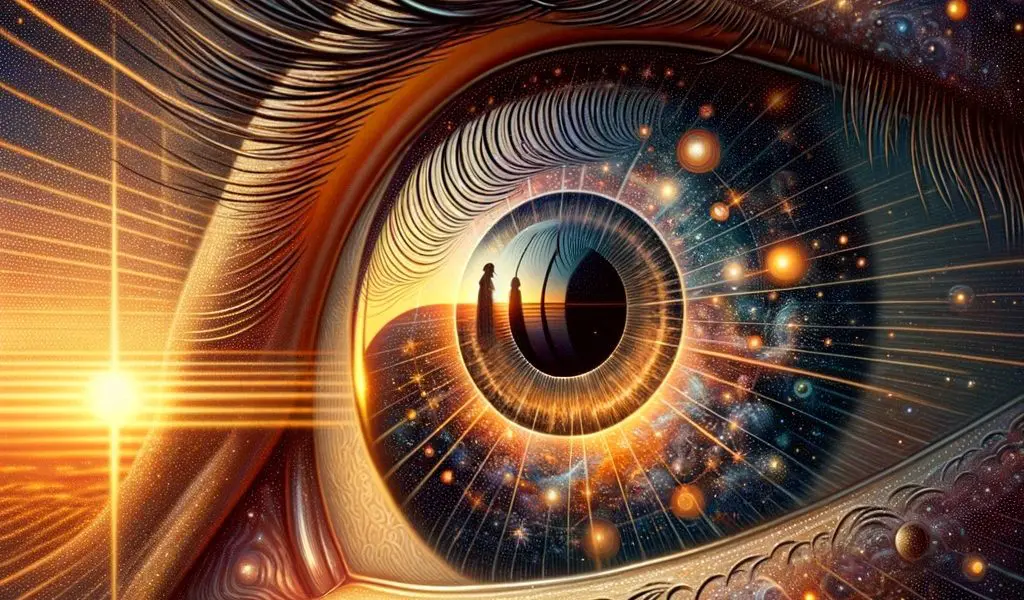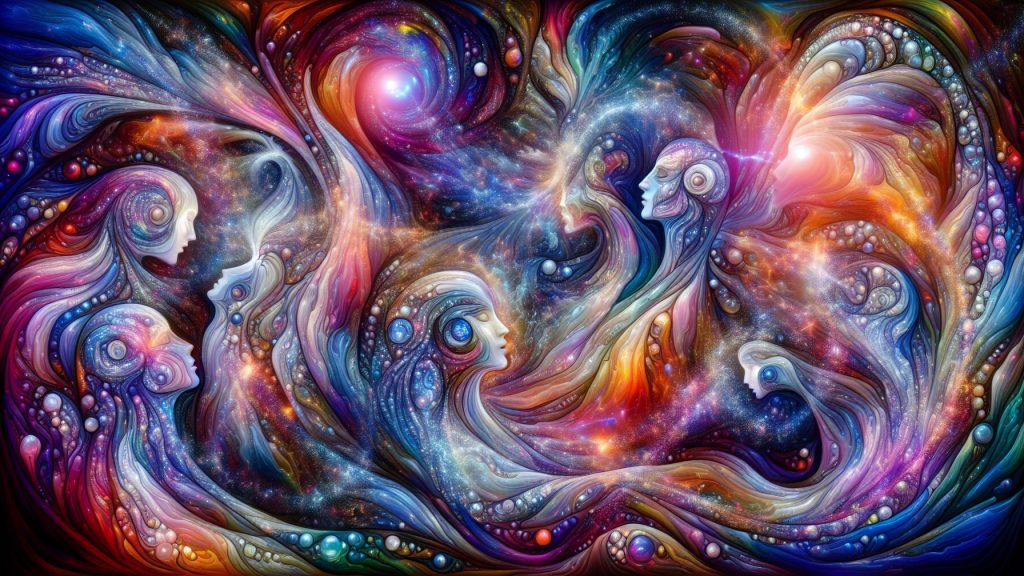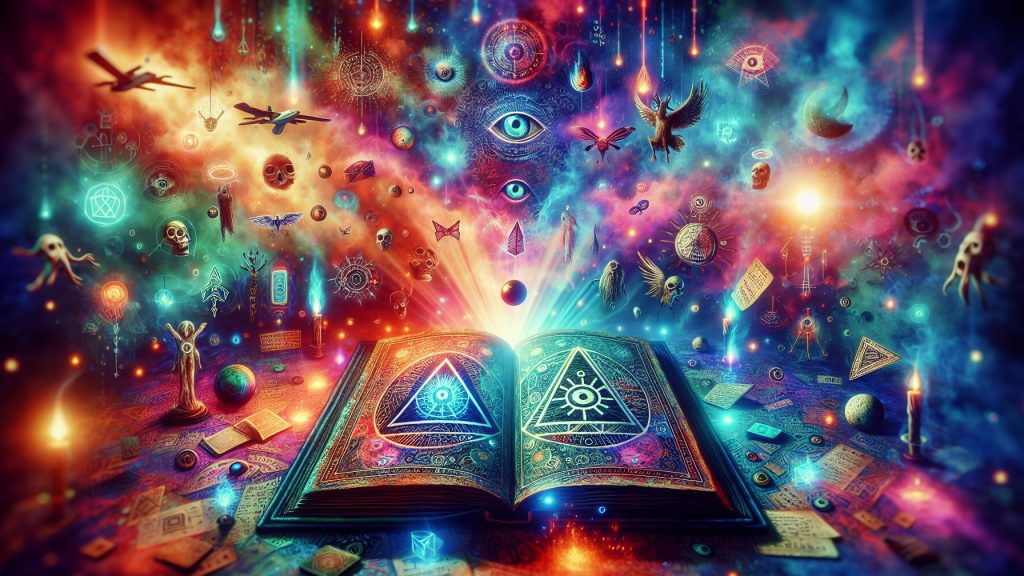
in this article
- Introduction
- Psychedelic Insights
- Psychedelic Entities
- Fringe Psychedelic Theories
- Psychedelic Utopianism
Are you 18 or older?
Please confirm that your are 18 years of age or older.
You are not allowed to access the page.

Disclaimer: The views and opinions expressed in this article are those of the authors and do not necessarily reflect the official policy or position of the Chemical Collective or any associated parties.
One of the reasons I wanted to write a book on the philosophy and psychology of psychedelic experiences was to defend a sceptical attitude towards these experiences. (My book is currently available for preorder, and you can read more information about it here.) The book’s title, Altered Perspectives, is partly related to this motive. Just as psychedelics can alter our perspectives about a number of things, we can also take alternative perspectives on what certain experiences mean, i.e. whether we jump to conclusions or adopt an approach of doubt, questioning, and critical thinking. Essentially, a philosophical approach towards altered states is a way of changing our perspectives towards an experience that (perhaps radically) changed our subjective experiences.
What I try to defend in the book, however, is an open form of scepticism, not the kind of knee-jerk, closed-off scepticism that dismisses the more profound, mystical, and alien aspects of psychedelic experience.
There is always a risk that the value of scepticism becomes hardened into an attitude of closed-mindedness, or a kind of scientism, which asks us to trust the efficacy of the scientific method to resolve non-scientific (e.g. philosophical) problems. Sometimes, certain questions are not – or are not currently – amenable to the scientific method of empirical investigation. But this does not make them pseudoscientific (since these questions are not intended to be scientific, or not wholly scientific, in nature). Pseudoscience, in contrast, consists of beliefs that a person claims to be scientific, or based on the scientific method, but which aren’t.
There are other methods of investigation we can use to test the truthfulness of a claim, such as working out how parsimonious, consistent, and coherent it is. If claims lack these features, and instead commit logical fallacies (of which there are many), then have good reason to doubt their veracity. Thus, we can apply psychedelic scepticism in cases in which empirical evidence doesn’t serve as a guide to truth. At the same time, we should also consider whether there is available empirical evidence that points to one theory being more parsimonious or likely to be true than another.
I would like to summarise some of the aspects of the psychedelic experience that I apply scepticism to. Part of the reason why I want to defend psychedelic scepticism in this book is because I feel there are certain kinds of experiences, and certain narratives around these experiences, that have not been questioned enough.

You can have all kinds of ‘insights’ on psychedelics. But how can you know whether to trust them or not? It would be extreme to accept anything that feels insightful as indicating truth, or some semblance of truth. After all, psychedelics (in both healthy and vulnerable individuals) have the potential to induce states of temporary psychosis, which are marked by delusions. These delusions could be of a paranoid nature (e.g. my friends are conspiring against me) or a grandiose/messianic nature (e.g. I am the second coming of Christ). When a person comes down from these experiences (assuming they don’t outlast the trip), they look back on these thoughts are clearly delusional and not grounded in reality. As I said in an interview with the philosopher Clifford Sosis:
One of the essays in my book, ‘Noetic Experiences and Spinoza’s God’, touches on the idea of false insights induced by psychedelics. This very phenomenon is now being scientifically studied. It’s also something I’ve written about for Psychedelic Support, and the journalist Shayla Love has covered this issue in an article for Vice. Scientists have found that the Aha! Moment can be artificially induced, and it can be applied to irrelevant information. I have no doubt psychedelics have the ability to induce this feeling of insight without actual insight. Moreover, the hyperconnectivity and plasticity we see in the brain following psychedelic intake can help explain some of the wild theories and connections people make while on psychedelics. In a 2023 preprint, a group of psychedelic researchers say increased neural plasticity induced by psychedelics increases the number of both true (and adaptive) and false (and maladaptive) insights.
Conversely, it would be hasty (and similarly unjustified) to reject every single insight on psychedelics, perhaps due to the belief that any chemical that disrupts or disorganises brain activity can only be a source of false insight. As I add in the interview with Sosis:
[I]t is an assumption that the experience is nothing but brain disorganisation. It is also doubtful whether all insights should be rejected solely as a consequence of more acute chaos or unpredictability in the brain. This assumes only the non-altered brain has access to true insight (the veracity of sober insights can often be doubted too, as research on the Aha! Moment has indicated).
So we have reasons to be sceptical of both sides of the coin: the tendency to trust anything that has the quality of the Aha! moment and the tendency to dismiss any insight with this quality, merely because it occurs during an altered state of consciousness. I tend to believe that it is more likely psychedelics provide genuine insights into the self (e.g. one’s self-image, past, current situation, authenticity, values, and inner potential), rather than metaphysics (i.e. the fundamental nature of reality). While psychedelic insights may align with fundamental reality (e.g. oneness), this could be coincidental – a result of unique psychedelic action on brain activity. It is much more radical to claim that the chemically disorganised brain is granted direct perception of the totality of things, or how things truly are.

There can be a tendency to ascribe a mind-independent existence to psychedelic entities because they appear to exist externally, that is, outside of our minds. In my book, I argue we have reasons to lean towards the opposite conclusion: the mind-dependence of these entities. One of these reasons is simplicity, or the application of Occam’s razor: not assuming the existence of new kinds of entities (i.e. supernatural ones) and a greater number of entities (i.e. ones besides the conscious entities – ourselves – having these experiences). We could say, then, that a naturalistic description of entity encounters could be more qualitatively and quantitatively parsimonious.
Just because an entity has the appearance of existing externally to us – we sense their presence outside of our bodies/consciousness, and they appear to possess their own intelligence – this does not mean they do, in fact, continue to exist when the acute psychedelic effects wear off. A counterargument may be that if we want to be sceptical about the external existence of psychedelic entities based on verisimilitude (something seeming real) potentially misleading us, then the sceptic should equally doubt everything that appears to them in sober, sensory perception. Everything could be a projection of mind.
While it may be true – as the neuroscientist Anil Seth has argued – that reality is a ‘controlled hallucination’, this does not mean there is not an external reality that still exists independently of us.
Extreme scepticism can make the simulation hypothesis – the idea that our reality is a computer simulation being run by an advanced civilisation – seem plausible. And of course, it is certainly possible it is true, although some philosophers find the idea implausible, given that it requires the assumption of computationalism and substrate independence (the views in philosophy of mind that state the mind works like a computer and that consciousness can emerge from any kind of physical substrate, such as silicon computer chips).
But there are other reasons to doubt the mind-independence of psychedelic entities. They tend to be quite anthropomorphic, which indicates they are based on human psychology. I have also not seen any convincing evidence that these entities possess – and reveal – ideas, information, or knowledge that could not have originated from the person’s mind. In addition, there is the argument that psychedelics activate innate cognitive tendencies – such as agency detection, anthropomorphism, and Theory of Mind (ToM) – which would explain why they appear as external, human-like beings.
But my doubts about the external existence of these entities do not mean I take a reductionist and dismissive approach towards entity encounters, which many sceptics might do. The biological and evolutionary factors that might underlie these encounters should not encourage us to view them as nothing but biological and evolutionary forces at play. These forces do not invalidate the phenomenology, meaning, value, life changes, and ethical sensibility associated with these types of entity encounters.

On my blog, I have addressed (and critiqued) some of the popular fringe psychedelic theories, such as Terence McKenna’s ‘Stoned Ape Theory’ and the connections made between the pineal gland and DMT. My book touches on these ideas (including a variation of the Stoned Ape Theory that links the origins of writing to psychedelics), as well as other, lesser-known fringe theories. These include the idea that DMT alien encounters are a reactivation of birth trauma and the notion that DMT-induced déjà vu is mystical in nature (e.g. it indicates that the DMT realm is our true ‘home’ or that it’s a glitch in the simulation). I also address ‘novelty theory’, another one of McKenna’s fringe theories, which states that the universe is moving towards a state of infinite novelty.

In my book, I also push back against the trend of idealism (in the attitudinal, not metaphysical, sense) and utopianism in the psychedelic community. Shayla Love has also written about why we should be wary of the promise of a psychedelic utopia. I point out that psychedelics can accommodate a variety of views, not just the kind of liberal, progressive views we think of as nice and peaceful. The use of psychedelics has also been linked to conspiracy thinking, ego inflation, narcissism, the promotion of hierarchical societies, right-wing ideologies, neo-Nazism, cults, violence, and sexual abuse.
Therefore, I think it is unrealistic and naive to trust that widespread psychedelic use will transform the world into a utopia.
Most of the people I see promoting the idea of a revolution in collective consciousness through psychedelics are the kind of people I would least trust to be in charge of social and political change. I’m sceptical of the idea that psychedelics – even when they offer uplifting or healing experiences – always change people’s personalities and attitudes in a positive direction. In some cases, the opposite is true.
An aspect of psychedelic utopianism is what I call psychedelic teleology, which has supernatural and naturalistic variations (and sometimes a combination of both worldviews). The supernatural version is that spirits reside in psychedelic plants and mushrooms and visit us in altered states in order to set humanity on the right track, that is, towards ecological balance and away from environmental destruction. The naturalistic variation is that, even if plant spirits do not exist, psychedelic compounds nonetheless exist because these plants and mushrooms are trying to instil an environmentalist mindset in us. It is indeed curious that environmental themes are common in psychedelic experiences, but this does not mean the only reason this happens is because these organisms have such a purpose.
It might seem unthinkable, but as genetics professor Noah Whiteman points out, psychedelic compounds likely exist in nature for reasons that have nothing to do with humans. A case can be made for psychedelic compounds, much like other psychoactive chemicals in nature, acting as a form of deterrent against predatory organisms.
Nevertheless, even if we have good reasons to doubt the teleological (goal-directed) qualities of natural psychedelics that psychonauts often ascribe to them, we can still harness the potential of psychedelics to promote pro-environmental behaviour. Growing evidence suggests that psychedelics can enhance nature relatedness and biophilia (how closely we identify with nature and fondness for nature, respectively), which are linked to pro-environmental behaviours. And these effects can be viewed in purely natural and non-teleological terms.
I don’t believe that a naturalistic or non-teleological perspective on psychedelics means we are devaluing, or even desacralising, these substances.
Psychedelic experiences, including ones that feature a sense of interconnection, are still immensely valuable – and perhaps even sacred – even if there are no spirits or plant intelligences at work during these experiences.
I am still open to the possibility that plant spirits, or purposeful plant or fungal intelligences, account for the wise messages delivered in the psychedelic state. But in my book, specifically the two-part essay ‘On Plant Spirits and Psychedelic Teleology’, I present a number of reasons why we should doubt that these are the most reasonable explanations.
Currently, I am working on a second book, focusing on the idea of ‘secular ecstasy’, or how people who subscribe to a secular, atheistic, or naturalistic worldview can meaningfully make sense of mystical experiences. Some of the book is a continuation of points raised in Altered Perspectives, delving much deeper into the debates involved. However, what I hope to flesh out more in the second book, which I didn’t do so much in the first, is how to positively integrate psychedelic experiences into one’s everyday life.
While psychedelic experiences can be deeply meaningful and transformative, there is a danger of clinging to them, wishing to experience those spiritual highs again. By actively trying to make sense of these experiences – metaphysically, existentially, and ethically – and making this sense-making consistent with one’s actions in everyday life, one can continue to benefit from these experiences without having to repeat them.
Sam Woolfe | Community Blogger at Chemical Collective | www.samwoolfe.com
Sam is one of our community bloggers here at Chemical Collective. If you’re interested in joining our blogging team and getting paid to write about subjects you’re passionate about, please reach out to David via email at blog@chemical-collective.com

Welcome to Chemical Collective.
Create an account to earn 200 welcome points.
Already have an account? Sign in


Check out our Community Blog and get involved with the conversation. You will be awarded 50 x ChemCoins for each comment up to a limit of 250 total ChemCoins.


Have you purchased any of our products? Reviews and reports are so important to the community. Share your honest opinion, and we’ll reward you with 50 ChemCoins for each review!


Every time you complete an order with us, you’ll be awarded ChemCoins for each Euro spent.
Welcome to Chemical Collective.
Create an account to earn 200 welcome points.
Already have an account? Sign in

Earn commission every time someone makes a purchase through your link.
When you become an affiliate, you will be allocated a unique link to share with your friends, followers, subscribers, or Aunt Susan.
You can choose to payout the commission earned once per month, or save it up to receive on a rainy day! Commission earned is 5% of the total order value per referral.
Contact us to join the Chemical Collective family and become an affiliate.
share your toughts
Join the Conversation.
Velice zajímavé, děkuji za tento příspěvek 🙂
Beautiful writing at the fringes of the comprehensible. Thanks, Sam. I’m looking forward to the book.